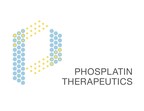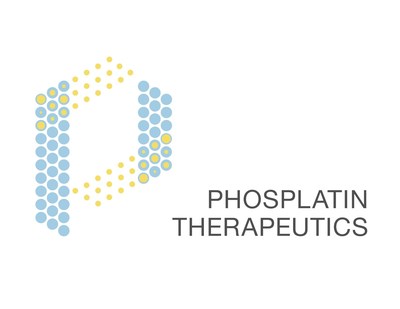
NEW YORK, May 20, 2021 /PRNewswire/ — Phosplatin Therapeutics Inc., a clinical stage pharmaceutical company focused on oncology therapeutics, today reported additional data in a sub-population of heavily pre-treated, patients with metastatic castrate-resistant prostate cancer (mCRPC) from its Phase 1b study of PT-112, the company’s lead clinical agent, in combination with PD-L1 inhibitor avelumab. The combination was generally well tolerated and demonstrated meaningful anti-tumor effects. The report from the study, entitled “A Phase 1b study of novel immunogenic cell death inducer PT-112 plus PD-L1 inhibitor avelumab in metastatic castrate-resistant prostate cancer (mCRPC) patients,” by lead author Alan H. Bryce, MD et al., is currently available online, as part of the 2021 ASCO Annual Meeting, which is taking place virtually from June 4-8, 2021.
“Such patients with late-stage prostate cancer have limited treatment options and are in need of new approaches to manage what is often aggressive disease,” said Matthew R. Price, co-founder and Chief Operating Officer. “We are encouraged by the prospect of using PT-112 in combination with immune-checkpoint inhibition, based upon our Phase 1b data.”
The PT-112-103-PAVE-1 study (NCT03409458) enrolled a total of 32 patients with mCRPC during dose-finding: 18 patients in the dose escalation phase, who received 150-200mg/m2 PT-112 on days 1, 8 and 15 of a 28-day cycle, and 14 patients in a supplemental cohort, who received 300 mg/m2 PT-112 on days 1 and 15. (Note: one patient received PT-112 on days 1 and 15 at 200mg/m2.) All patients received avelumab (800 mg) on days 1 and 15. Patients had exhausted available therapies, with a median 7 lines of prior treatment. Key findings included the following:
- PT-112 treatment in combination with avelumab was generally well tolerated in this heavily pre-treated, advanced mCRPC patient population with no available life-prolonging therapeutic options
- The combination provided meaningful antitumor effects, including decreases in tumor volume as well as reductions in prostate-specific antigen (PSA) and alkaline phosphatase (ALP) serum markers.
- Antitumor effects included eight (25%) patients with a PSA reduction of ≥50% (PSA50), five (16%) of which were confirmed. Of 10 patients with RECIST-measurable disease, three had tumor volume reductions, one with a confirmed partial response (PR). Twenty-four (75%) patients showed a reduction in serum alkaline phosphatase (ALP). Reductions in ALP may be indicative of anti-cancer activity at bone sites of disease. Improvement in patient-reported pain was also observed.
- At the higher dose level (300 mg/m2 PT-112, given every two weeks) 4 of 13 (31%) experienced PSA50 reduction, confirmed in 3 of 13 (23%) patients.
The PT-112-103-PAVE-1 study has completed the dose escalation phase, and a dose confirmation cohort in non-small cell lung cancer is currently enrolling.
Additionally, the Phase 2 PT-112 monotherapy trial (NCT02266745) is currently enrolling patients with late-stage mCRPC.
“The early results of our immunotherapy combination in this sub-population clearly indicate the potential of such a treatment paradigm for patients with metastatic castrate-resistant prostate cancer,” said Joseph F. O’Donnell, MD, Chief Medical Officer at Phosplatin Therapeutics. “We continue our work to demonstrate the effects of PT-112’s immunogenic cell death (ICD) induction, including with immune-profiling analyses, and also believe its osteotropism lends further rationale to treat these patients, most of whom have bone metastatic involvement. We are grateful to our wonderful collaborators and are encouraged to continue further clinical development of PT-112 in patients with advanced prostate cancer with our ongoing Phase 2 monotherapy trial.”
“A Phase 1b study of novel immunogenic cell death inducer PT-112 plus PD-L1 inhibitor avelumab in metastatic castrate-resistant prostate cancer (mCRPC) patients” is available for viewing in the ASCO Meeting Library at https://meetinglibrary.asco.org/record/198271/abstract.
About PT-112
PT-112 is a novel small molecule conjugate of pyrophosphate that possesses a unique pleiotropic mechanism of action that promotes immunogenic cell death (ICD), through the release of damage associated molecular patterns (DAMPs) that bind to dendritic cells and lead to downstream immune effector cell recruitment in the tumor microenvironment. PT-112 represents the best-in-class small molecule inducer of this immunological form of cancer cell death and is currently under Phase 2 development. Further, PT-112 harbors a property known as osteotropism, or the propensity of the drug to reach its highest concentrations in certain areas of the bone, making it a candidate for treatment of patients with cancers that originate in, or metastasize to, the bone. The first in-human study of PT-112 demonstrated an attractive safety profile and evidence of long-lasting responses among heavily pre-treated patients and won “Best Poster” within the Developmental Therapeutics category at the ESMO 2018 Annual Congress. The combination Phase 1b dose escalation study of PT-112 with PD-L1 checkpoint inhibitor avelumab in solid tumors was reported in an oral presentation at the ESMO 2020 Virtual Congress. The Phase 1 study in patients with relapsed or refractory multiple myeloma presented at ASH is the third completed Phase 1 study of PT-112. Monotherapy phase 2 development is ongoing in mCRPC, and the anti-PD-L1 combination study is ongoing in a dose confirmation cohort of patients with non-small cell lung cancer (NSCLC).
About Phosplatin Therapeutics
Phosplatin Therapeutics Inc. is a privately held, clinical stage pharmaceutical company that holds exclusive global license to phosphaplatins, a family of small molecules rationally designed to circumvent the mechanisms of drug resistance and toxicity commonly associated with chemotherapeutic regimens. The company’s lead candidate, PT-112, is a novel chemical entity under clinical development that exhibits a unique combination of properties, including immunogenic cell death and osteotropism. Clinical data generated to date across three Phase 1 studies have demonstrated single-agent anti-cancer activity and an attractive tolerability profile, and two Phase 2 studies of PT-112 are underway. The company’s research and development work to date has spanned fifteen countries and been funded by private investors and family investment offices in the United States, Europe and Asia, along with a sub-license agreement for the development, commercialization and use of PT-112 in Greater China. The company sponsors the ongoing clinical study of PT-112 in combination with the PD-L1 inhibitor avelumab under a collaboration agreement with Pfizer and Merck KGaA, Darmstadt, Germany (operating as EMD Serono in the US and Canada).
CONTACTS:
Phosplatin Therapeutics
Taylor B. Young
Senior Director of Strategic Development
Tel: +1 646 380 2441
Email: tyoung@phosplatin.com
Westwicke, an ICR Company
Investors:
Stephanie Carrington
Tel: +1 646 277 1282
Email: Stephanie.Carrington@westwicke.com
Media:
Mark Corbae
Tel: +1 203 682 8288
Email: mark.corbae@westwicke.com
![]() View original content to download multimedia:http://www.prnewswire.com/news-releases/phosplatin-therapeutics-reports-phase-1b-study-results-of-immunogenic-cell-death-inducer-pt-112-plus-pd-l1-inhibitor-avelumab-in-metastatic-prostate-cancer-at-asco-annual-meeting-301296485.html
View original content to download multimedia:http://www.prnewswire.com/news-releases/phosplatin-therapeutics-reports-phase-1b-study-results-of-immunogenic-cell-death-inducer-pt-112-plus-pd-l1-inhibitor-avelumab-in-metastatic-prostate-cancer-at-asco-annual-meeting-301296485.html
SOURCE Phosplatin Therapeutics

























